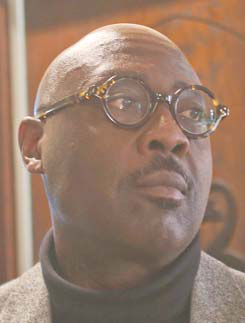Renowned professor leads workshop examining institutionalized racism

By Sean Barron
YOUNGSTOWN

Rev. Dr. Willie J. Jennings
A truly comprehensive look at the many entanglements of racism and its cultural, individual and institutional effects requires a deeply-rooted examination of spaces and their relationships with history and time, a theology and Africana studies professor contends.
“Race is a matter of geography, constructed in a world the way the rich want it to be,” the Rev. Dr. Willie J. Jennings explained during his keynote address for Monday morning’s 35th annual Community Workshop Celebrating the Life & Legacy of Dr. Martin Luther King Jr.
The Martin Luther King Jr. Planning Committee of Mahoning County sponsored the 3 Ω-hour program at First Presbyterian Church, 201 Wick Ave., downtown.
A main thrust of the gathering, themed “Remembering what is civil and doing what is right,” was to examine and develop ways to tackle institutionalized racism. The dozens of attendees also broke into groups focused on education, challenges facing young people, entrepreneurship and criminal-justice issues.
The Rev. Mr. Jennings, an associate professor at Yale Divinity School, explained that when it comes to race, American society is repeating certain remnants of its dark past. At the same time, however, we are in “unchartered territory,” meaning that the vast majority of Americans are convinced segregation is wrong, yet some in positions of power blatantly promote such racial philosophies, he continued.
Also troubling is that some Christians adhere to negative racial undertones while assuming they are the norm, said Mr. Jennings, author of the 2010 book “The Christian Imagination: Theology and the Origins of Race.”
“They are never natural or normal,” he added.
The historical relationship between race and space in the U.S. can be traced to so-called “sundown” towns and villages, which were all-white municipalities and enclaves created in waves of violence during the early 20th century to exclude and oppress blacks and other nonwhite people via intimidation, violence and discriminatory laws and customs. Many such towns dotted the landscape in Ohio, Indiana, Illinois and other states outside of the Jim Crow South, according to the 2005 book “Sundown Towns: A Hidden Dimension of Racism,” by James Loewen.
Racism also can be traced to colonial times in which attaining land and maintaining whiteness were primary aims. Separating nonwhite people from their properties became more important than the relationship those who inhabited the land had with it, he continued, noting that this created a blueprint for segregated spaces, as well as exploitation, isolation and fragmentation.
“This is not by accident, but by design,” Mr. Jennings added.
Too often, many people have normalized such disparities and inequality, so it’s vital to tell the truth regarding the history of cities or towns, as well as that of their nonwhite residents, he explained. Other imperatives are for churches to play pivotal roles in the geographic shaping and reshaping of communities and to see the connection between “space and discipleship” and that they matter to God, Mr. Jennings pointed out.
He also urged attendees to make their voices more readily heard in matters that affect their communities by attending meetings, maintaining hope and placing “moral pressure on the thinking of decision-makers” to act responsibly, he said.
After Mr. Jennings’ presentation, the groups shared ideas on the four topics.
The entrepreneurial panel said it’s important for the city of Youngstown to incorporate a minority business enterprise, for people to educate themselves more on racism and for them to attend gatherings intended to break down barriers to success.
The education group focused on three initiatives: expanding internships related to school attendance, adding more youth groups and enhancing the Youngstown City Schools via student-retention rates.
Those who met to address challenges facing many youths said they felt too few opportunities remain for young people in the city. Also, students need to have a greater say in decisions regarding their schools and communities, and meet more regularly with school officials, a group member said.
Stepped-up efforts are needed to better acclimate people being released from prison to society, in conjunction with such agencies as Home for Good and the Oakhill Collaborative, noted Judge Carla Baldwin of Youngstown Municipal Court, who moderated the criminal-justice group.
Better education and assistance to organizations designed to provide support toward helping former inmates become viable citizens also is critical for achieving those goals, Judge Baldwin said.
The first meeting to address such topics is set for noon Feb. 10 at First Presbyterian Church, she said.
Additional remarks came from the Rev. Kenneth L. Simon, pastor of New Bethel Baptist Church; the Rev. Lewis W. Macklin II, pastor of Holy Trinity Missionary Baptist Church; Jaladah Aslam, a Martin Luther King Planning Committee co-convener; and the Rev. Rebecca Kahnt of First Presbyterian.
 43
43
